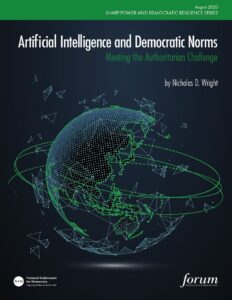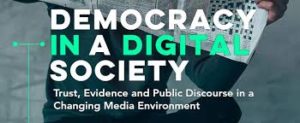 Senior White House officials appeared at a conference on emerging technologies to reinforce the message that Washington and its allies must close ranks to ensure that advances in artificial intelligence are developed in accordance with “democratic values”, and not left to China, the SCMP reports.
Senior White House officials appeared at a conference on emerging technologies to reinforce the message that Washington and its allies must close ranks to ensure that advances in artificial intelligence are developed in accordance with “democratic values”, and not left to China, the SCMP reports.
“We can’t let China write the rules around AI,” US Commerce Secretary Gina Raimondo told the Global Emerging Technology Summit in Washington. “It’s important that AI is developed in a way and regulated in a way that is consistent with our democratic values of freedom and openness, protection for intellectual property, respect for human rights and respect for privacy” (as a recent Forum report – left – observed).
US Secretary of State Antony Blinken highlighted the importance of cyber-diplomacy, noting that “our democratic values and way of life” are “fundamentally what’s at stake here.”
Blinken added that “it’s not enough to highlight the horrors of techno-authoritarianism — to point to what countries like China and Russia are doing and say that it’s wrong and dangerous, even as it is.”
Rapid adoption of artificial intelligence (AI) technologies and increased reliance upon AI by both governments and the private sector have led to rising concern about potential negative implications for human dignity, democratic accountability, and the bedrock principles of free societies, according to Eileen Donahoe, and Megan MacDuffee Metzger.*
Democracies need a global governance framework to address the wide range of societal challenges associated with AI, including threats to privacy, information access, and the right to equal protection and nondiscrimination. Rather than working to develop new frameworks from scratch, the challenges associated with AI can best be confronted by drawing on the existing international human-rights framework, they wrote in the Journal of Democracy.
 The first wave of the digital revolution emphasized democracy and human rights but gave way to a second wave that allows authoritarian governments to infringe on those rights, said National Security Adviser Jake Sullivan. In the third wave, Sullivan said, democratic nations must shape the way technologies like artificial intelligence are used.
The first wave of the digital revolution emphasized democracy and human rights but gave way to a second wave that allows authoritarian governments to infringe on those rights, said National Security Adviser Jake Sullivan. In the third wave, Sullivan said, democratic nations must shape the way technologies like artificial intelligence are used.
“The question before us is whether we …. can reboot and ensure that critical and emerging technologies work for, not against, our democracies and our security,” he said.
The concept of trusted connectivity offers a democratic alternative to what China has on offer—one that can help build public trust in digital and physical infrastructure and technology, adds Kaush Arha, a nonresident senior fellow at the Atlantic Council’s Scowcroft Center for Strategy and Security and former senior advisor for strategic engagement at the US Agency for International Development.
 Democracies function on the trust of their citizens. When leaders lose it, they’re voted out. Trusted connectivity stems from political and legal systems committed to individual rights and dignity, and free and open societies and markets, as opposed to autocratic systems and state capitalism or mercantilism. The term brings together two important strands—trust and connectivity—that are already defining the democratic response to meet global infrastructure demand, he writes. RTWT
Democracies function on the trust of their citizens. When leaders lose it, they’re voted out. Trusted connectivity stems from political and legal systems committed to individual rights and dignity, and free and open societies and markets, as opposed to autocratic systems and state capitalism or mercantilism. The term brings together two important strands—trust and connectivity—that are already defining the democratic response to meet global infrastructure demand, he writes. RTWT
* National Endowment for Democracy board member Eileen Donahoe, former U.S. ambassador to the UN Human Rights Council in Geneva, is executive director of the Global Digital Policy Incubator and adjunct professor at Stanford University’s Center on Democracy, Development, and the Rule of Law. Megan MacDuffee Metzger is research scholar and associate director for research at the Global Policy Incubator. Follow them on Twitter @EileenDonahoe and @meganicka.







